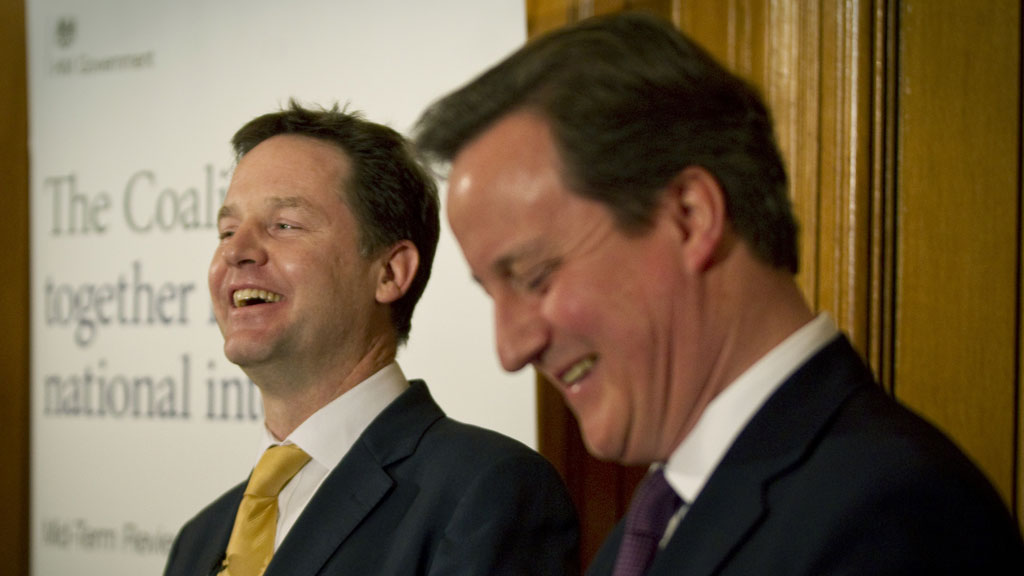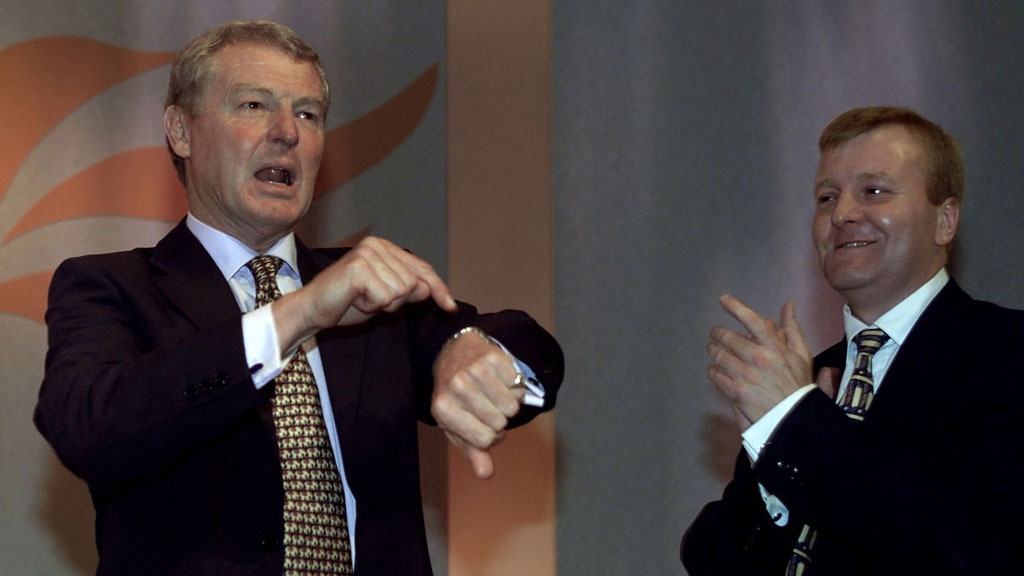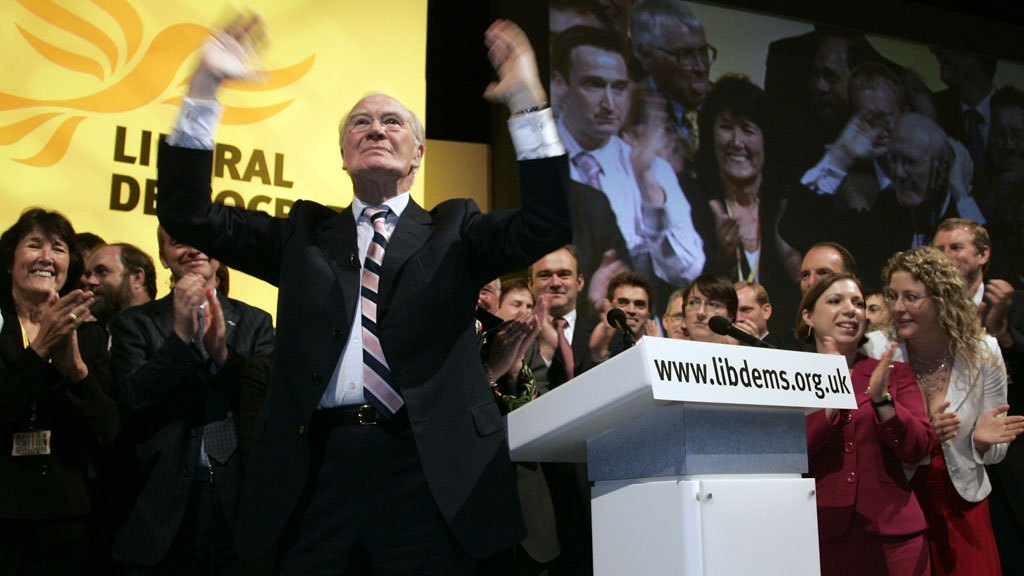Lib Dems celebrate 25th anniversary
As the Liberal Democrats mark a quarter of a century as a party, Channel 4 News looks at the highs and lows under four leaders and five general elections.

It was on 3 March 1988 that the Liberals and Social Democrats merged into a single party, following seven years as an electoral alliance.
Twenty-five years on, leader Nick Clegg has just managed what Lib Dems have traditionally been best at – winning by-elections, albeit a seat the party already held.
Retaining Eastleigh is a coup for Mr Clegg in the midst of the Lord Rennard affair. There is also relief for the party, which was forced to fight a by-election after the resignation of Lib Dem cabinet minister Chris Huhne.
Highs
It is difficult to over-emphasise what a tough time the Lib Dems have had since they entered a coalition government with David Cameron’s Conservatives, and holding on to this Hampshire seat is guaranteed to put smiles on their faces.
The party’s greatest achievement, after years of battling against a seemingly impregnable two-party system, was taking power after the 2010 election.
Under the first-past-the-post (FPP) electoral system, it is impossible for the Lib Dems to govern on their own and hung parliaments are extremely uncommon in Britain.
But that is what happened three years ago, when the Conservatives won the largest number of seats, but were short of a majority and needed Lib Dem support.
Mr Clegg became deputy prime minister, while several ministerial posts were occupied by his Lib Dem colleagues. At last, the party was in power, despite FPP.
At the 1992 election, with Paddy Ashdown at the helm, the Lib Dems won 20 seats. Five years later, this doubled to 46.
In 2001, under Charles Kennedy’s leadership, 52 seats were won, a tally that climbed to 62 in 2005. This success is often attributed to the “key seats” emphasis of election strategist Lord Rennard.

This fell to 57 at the last election, but the Tories’ failure to win an overall majority made this irrelevant, and Mr Clegg and his colleagues used their new-found power to lobby for a change in the voting system that would more accurately reflect the share of the vote they attract in elections.
Before they found themselves in power, the Lib Dems were renowned for their ability to take seats from the Conservatives and Labour in by-elections as they successfully capitalised on the protest vote.
They achieved this in the Tory seats of Eastbourne, Ribble Valley and Kincardine and Deeside under Paddy Ashdown, while opposition to the Iraq war helped them win the Labour seats of Brent East and Leicester South when Charles Kennedy was leader.
This continued under Sir Menzies Campbell, who captured Dunfermline and West Fife from Labour; a blow to the then chancellor Gordon Brown, who lives in the seat and represents the constituency next door.
Lows
In 1992, Paddy Ashdown (pictured above with Charles Kennedy) admitted a previous affair with his secretary and was dubbed “Paddy Pantsdown” by the Sun.
Before the 1997 election, he was hopeful a deal might be struck with Labour if Tony Blair failed to achieve the majority he needed to topple John Major’s Tories on his own.
In the event, Labour achieved a landslide that was repeated in 2001, leaving the Lib Dems without any bargaining power.
The then Mr Ashdown (now Lord) was succeeded by Charles Kennedy, who talked about replacing the Conservatives as the main opposition party.
Many anticipated a breakthrough for the Lib Dems at the 2005 election, but although 62 seats were won, the political landscape did not change.
This was followed by the controversy over the £2.4m donation to the Lib Dems from Michael Brown, who went on the run and was subsequently convicted in his absence of theft and sentenced to seven years in prison.
It was the biggest donation the party had ever received, and it was under pressure to return the money. But the Electoral Commission said the donation had been received in good faith and this was unnecessary.
The following year, after a great deal of nudge nudge, wink wink speculation, Mr Kennedy admitted he had a drink problem and said he was calling a leadership election.
He had intended to stand in this election, but when it became apparent he did not have the backing he needed, he resigned as leader.

He was succeeded by Sir Menzies Campbell (pictured above), whose leadership, and age, attracted criticism – described by Nick Clegg as “barely disguised ageism”.
This led to his resignation after less than two years in the job. Mr Clegg took over, narrowly defeating Chris Huhne in the leadership election.
Three years later, during the 2010 election campaign, his performances in the televised leaders’ debates impressed, and he claimned his reward shortly afterwards when he became deputy prime minister.
The Lib Dems had campaigned against student tuition fees, but when the coalition government announced it was raising them to a maximum £9,000 a year, Mr Clegg had to eat humble pie – while the party’s poll ratings slumped and have never recovered.
Apart from Eastleigh, real election results have not been much better: coming a distant sixth in the Barnsley by-election, losing control of the city of Sheffield – where Mr Clegg is an MP – and being left with fewer than 3,000 councillors for the first time in the party’s history.
Despite managing to secure a referendum on a replacement for FPP, two-thirds of those voting opposed the alternative vote system the Lib Dems had championed. They also failed to secure a largely elected House of Lords.
Then came Chris Huhne, who resigned from the cabinet after being charged with perverting the course of justice for asking his wife to take his speeding penalty points.
During his court case, he initially denied the charges, but later changed his plea and is awaiting sentence.
At the moment, Mr Clegg is embroiled in the Lord Rennard affair. As revealed by Channel 4 News, the former Lib Dem chief executive has been accused of sexual impropriety by several women colleagues, and the Metropolitan police are considering if any criminal activity took place.
Lord Rennard has denied the allegations.
With Mr Clegg changing his story about what he knew and when, the Lib Dem leader is finding that a week really is a long time in politics, as Harold Wilson famously said.
And after 25 years, the Lib Dems are finding that life really is tough at the top.
-
Latest news
-
Labour government ‘must start tackling climate crisis on day one’, says Wildlife Trust chief7m

-
King Charles pays tribute to veterans on D-Day 80th anniversary7m

-
Vaughan Gething scandal may alienate people from politics ahead of election, says Nation Cymru associate editor5m

-
Wales First Minister Vaughan Gething in tears as he loses confidence vote9m

-
Do Tory and Labour tax claims add up?12m

-




